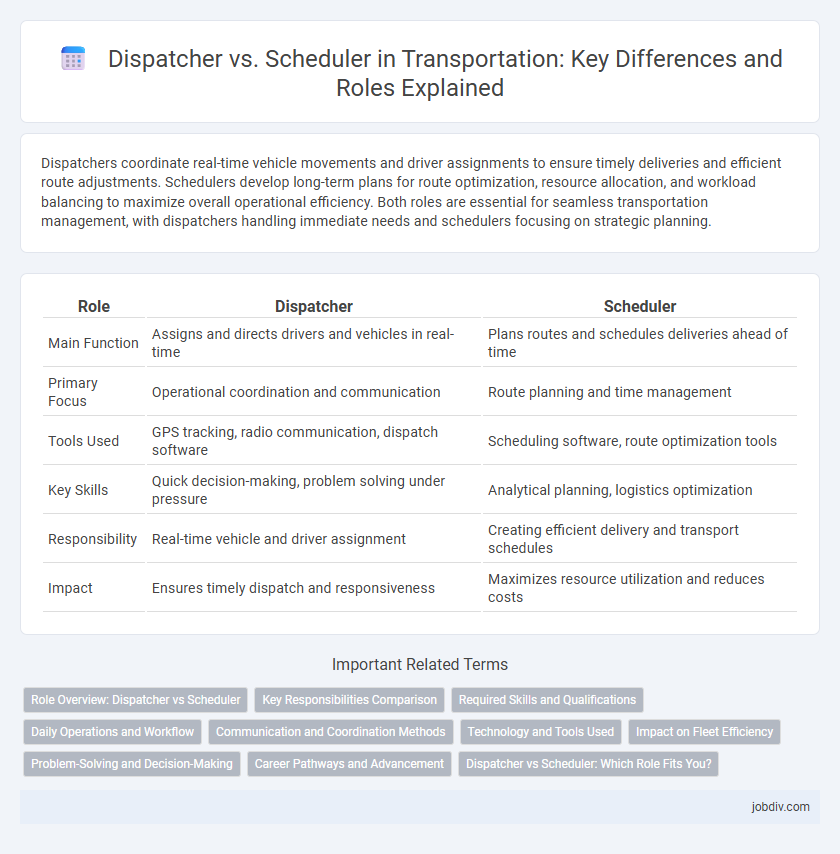Dispatchers coordinate real-time vehicle movements and driver assignments to ensure timely deliveries and efficient route adjustments. Schedulers develop long-term plans for route optimization, resource allocation, and workload balancing to maximize overall operational efficiency. Both roles are essential for seamless transportation management, with dispatchers handling immediate needs and schedulers focusing on strategic planning.
Table of Comparison
| Role | Dispatcher | Scheduler |
|---|---|---|
| Main Function | Assigns and directs drivers and vehicles in real-time | Plans routes and schedules deliveries ahead of time |
| Primary Focus | Operational coordination and communication | Route planning and time management |
| Tools Used | GPS tracking, radio communication, dispatch software | Scheduling software, route optimization tools |
| Key Skills | Quick decision-making, problem solving under pressure | Analytical planning, logistics optimization |
| Responsibility | Real-time vehicle and driver assignment | Creating efficient delivery and transport schedules |
| Impact | Ensures timely dispatch and responsiveness | Maximizes resource utilization and reduces costs |
Role Overview: Dispatcher vs Scheduler
A dispatcher coordinates real-time vehicle movements and communicates directly with drivers to ensure timely pickups and deliveries, optimizing route efficiency and responding to unexpected changes. A scheduler plans and organizes transportation schedules in advance, allocating resources and creating timetables to maximize fleet utilization and meet service commitments. Both roles are essential for seamless transportation operations but differ primarily in proactive planning versus reactive management.
Key Responsibilities Comparison
Dispatchers coordinate real-time vehicle movements, manage route adjustments, and communicate with drivers to ensure timely deliveries. Schedulers develop detailed transportation plans, allocate resources efficiently, and create driver work schedules to optimize operational flow. Both roles are essential for seamless logistics management but focus respectively on execution versus planning aspects within the transportation process.
Required Skills and Qualifications
Dispatchers require strong communication skills, the ability to manage real-time logistics, and proficiency in transportation management systems (TMS) to coordinate vehicle routes and handle emergencies efficiently. Schedulers need excellent organizational skills, analytical capabilities to optimize delivery timelines, and familiarity with supply chain software to plan and assign transportation tasks effectively. Both roles demand attention to detail, problem-solving skills, and knowledge of industry regulations such as DOT compliance.
Daily Operations and Workflow
Dispatchers coordinate real-time vehicle movements and driver assignments, ensuring timely pickups and deliveries within daily operations. Schedulers plan routes and allocate resources ahead of time, optimizing workflow efficiency and minimizing delays. Both roles integrate to maintain seamless transportation flow, balancing immediate response with strategic planning.
Communication and Coordination Methods
Dispatchers utilize real-time communication tools such as radios and GPS tracking systems to coordinate immediate vehicle movements and respond to on-the-ground changes. Schedulers rely on planning software and detailed timetables to organize routes and allocate resources ahead of time, ensuring efficient workflow. Effective transportation management depends on the synchronized use of both dispatcher instant communications and scheduler strategic coordination methods.
Technology and Tools Used
Dispatchers utilize real-time GPS tracking systems and advanced communication platforms to coordinate vehicle movements and respond swiftly to changes. Schedulers rely on software with powerful algorithmic optimization and predictive analytics to plan efficient routes and allocate resources effectively. Both roles increasingly depend on integrated Transportation Management Systems (TMS) to streamline operations and enhance overall logistics performance.
Impact on Fleet Efficiency
Dispatchers coordinate real-time vehicle movements, ensuring timely responses to route changes and unforeseen delays, which directly enhances fleet efficiency by minimizing idle time. Schedulers plan optimal routes and allocate resources in advance, reducing operational costs and improving fuel efficiency through strategic planning. Together, effective dispatching and scheduling streamline fleet operations, leading to increased productivity and lower overhead expenses.
Problem-Solving and Decision-Making
Dispatchers excel in real-time problem-solving by managing unexpected delays, route adjustments, and resource allocation to ensure timely deliveries. Schedulers focus on strategic decision-making, optimizing routes and workforce assignments based on predictive data and demand forecasts. Effective transportation management relies on the complementary strengths of dispatchers' immediate responsiveness and schedulers' long-term planning efficiency.
Career Pathways and Advancement
Dispatchers manage real-time logistics and coordinate vehicle routes, often advancing to operations manager or logistics coordinator roles. Schedulers focus on planning routes and timing to optimize efficiency, with career trajectories leading to supply chain analyst or planning supervisor positions. Both roles require strong organizational skills and offer pathways into higher management within transportation and logistics sectors.
Dispatcher vs Scheduler: Which Role Fits You?
Dispatchers coordinate real-time logistics by managing vehicle routes, communicating with drivers, and responding to unexpected delays, ensuring efficient delivery and safety. Schedulers focus on long-term planning, creating optimal transportation timetables and allocating resources to meet demand while minimizing costs. Understanding whether you excel in dynamic problem-solving and quick decision-making or strategic planning and resource management will help determine if the dispatcher or scheduler role suits you best.
Dispatcher vs Scheduler Infographic

 jobdiv.com
jobdiv.com